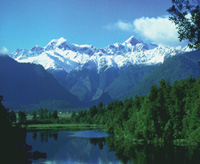New Zealand to become world's first greenhouse gas-neutral country
New Zealand's leader on Tuesday set her people the ambitious goal of becoming the world's first greenhouse gas-neutral country, and pledged big emission cuts by government and set compulsory targets for biofuel use as initial steps.

In her first major speech to Parliament for 2007, Prime Minister Helen Clark likened the threat of climate change to that of nuclear holocaust during the Cold War, and said New Zealand must lead the way in combatting it.
"I believe New Zealand can aim to be the first nation to be truly sustainable across the four pillars of the economy, society, the environment, and nationhood," Clark said. "I believe we can aspire to be carbon neutral in our economy and way of life."
She announced a series of measures committing New Zealand to environmental targets that no other developed nation has been prepared to consider - an ambitious agenda given New Zealand already is struggling to meet its Kyoto Protocol commitment to cut greenhouse gas emissions to 1990 levels by 2012.
Among measures Clark announced was that clean-burning biofuels must make up 3.4 percent of fuel sold in the country by 2012 to replace gasoline and diesel, and a campaign to help households save energy and cut waste.
She said all 47 government agencies would take immediate steps toward the aim of becoming carbon neutral by using energy efficient transport and buildings, and slashing fuel bills. The government would use only recycled paper and other environmentally friendly products.
The government would hold meetings with business and farm groups to encourage those sectors to adopt more environmentally friendly approaches.
Opposition National Party leader John Key ridiculed the environmental plan, saying it would have an insignificant effect on global warming.
But it was welcomed by New Zealand's Business Council for Sustainable Development, a group of companies who promote energy efficiency and other environmental goals, as a "sea change in the way the country will handle climate change and protect its trading position for long term success."
Clark said New Zealand could set an example for the world on climate change as it did in the 1980s with its nuclear free policies - a stand that included bans on nuclear-powered ships that strained relations with military allies such as the United States, the AP reports.
"Two decades ago it was the threat of nuclear war destroying the world as we knew it which galvanized New Zealand to become nuclear free," she said, adding that the policy had since become "central to our national identity."
"So it must be with this century's environmental sustainability challenge," she said. "We have to make a stand for our world, and for our own sake."
Subscribe to Pravda.Ru Telegram channel, Facebook, RSS!





